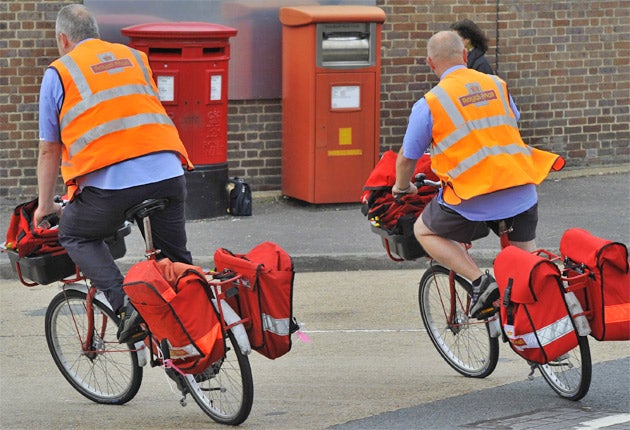Royal Mail in line for 'Tell Sid' privatisation

Your support helps us to tell the story
From reproductive rights to climate change to Big Tech, The Independent is on the ground when the story is developing. Whether it's investigating the financials of Elon Musk's pro-Trump PAC or producing our latest documentary, 'The A Word', which shines a light on the American women fighting for reproductive rights, we know how important it is to parse out the facts from the messaging.
At such a critical moment in US history, we need reporters on the ground. Your donation allows us to keep sending journalists to speak to both sides of the story.
The Independent is trusted by Americans across the entire political spectrum. And unlike many other quality news outlets, we choose not to lock Americans out of our reporting and analysis with paywalls. We believe quality journalism should be available to everyone, paid for by those who can afford it.
Your support makes all the difference.Royal Mail could be sold back to the public in a "Tell Sid"-style share offering redolent of the Conservatives' big state privatisations of decades ago, the Coalition Government said yesterday, as it confirmed plans to end hundreds of years of state ownership of the national postal service.
In a much more extensive sale than expected, the Government said it would dispose of some or all of the state's 100 per cent holding in the publicly owned company in a private sale or a public share offering, akin to the sell-offs of British Telecom, British Airways and British Gas in the 1980s.
To make the shrinking business more attractive, the state will take over Royal Mail's £8bn pension black hole, assuming the fund's future liabilities of £34bn, but gaining assets of £26bn, which may be sold off to reduce the budget deficit.
At the same time, the Government promised to save Britain's 11,500 Post Office branches by hiving them off from Royal Mail Group into a mutual, with talks already under way with the Co-operative movement.
The Business Secretary, Vince Cable, said Royal Mail's requirement to deliver letters all over the UK six days a week for the same price – its "universal service obligation" – would be written into the contract of any sale. Previous attempts by Conservative and Labour administrations to part-privatise the company have failed, after running into fierce opposition from unions and customers. Mr Cable said delay was no longer possible because of the poor state of the business and the public coffers.
"Royal Mail is in a difficult position," he said. "There is no hiding from the facts: mail volumes falling, a multi-billion-pound pension deficit, less efficiency than competitors and an urgent need for more capital at a time when there are huge constraints to the public purse. My policy is to put them [Royal Mail and the Post Office] on a stable footing for the future."
The Government said it was open-minded about who would buy the service, or when it would be sold. Buyers could include private equity firms or existing postal service operators, such as Dutch-owned TNT. But the Business Secretary also said there could be an IPO (Initial Public Offering), in which Royal Mail would be floated on the London Stock Exchange.
Asked whether that would amount to a "Tell Sid"-style privatisation – a reference to Margaret Thatcher's cut-price sale of British Gas in 1986, which was aimed at encouraging ordinary people to buy shares – he replied: "It could be, that's one of the options." He added that in any sale the Royal Mail's 150,000 staff would receive 10 per cent of shares.
The Government said there would be no further closures of Post Offices, which would be found new trade. "We will break the cycle of declining visitor numbers [to Post Offices] through new ideas and new services to win back customers," Mr Cable said. He added that he hoped the branches would be able to service current account customers of the main high-street banks, two of which – RBS and Lloyds-HBOS – are now partly publicly owned.
The Post Office could be turned into a John Lewis-style partnership, owned by its employees, or on a Co-operative basis, owned by postmasters and mistresses, staff and even the public.
The Communication Workers Union criticised the Government's "obsession" with privatisation and warned that customers and Post Offices would suffer. "Handing postal services over to the City spivs and gamblers that Vince Cable recently denounced, but is now feeding, will be bad news for everyone," said its general secretary Billy Hayes.
Join our commenting forum
Join thought-provoking conversations, follow other Independent readers and see their replies
Comments